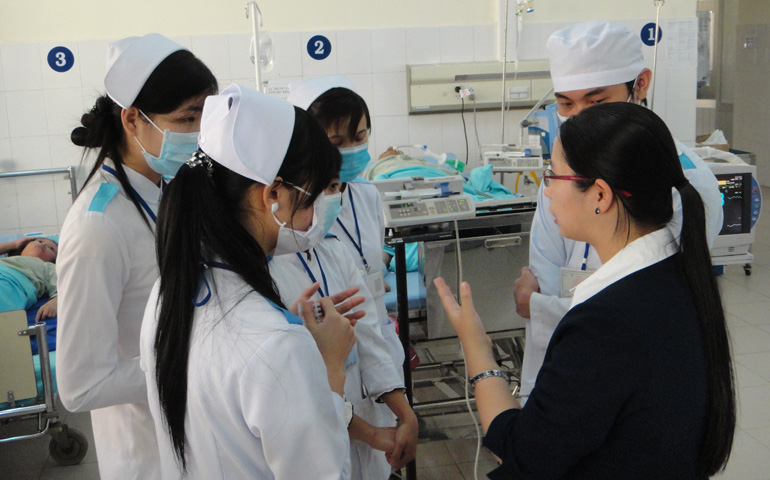
Vietnamese students learning medicine in Dalat Hospital
Pope Francis has told us to go and work at the peripheries. That's where the need is greatest: among the poor, among the neediest. That's where we learn what church is all about.
In this context, I'd like to update you on the work of a Jesuit friend and former NCR board member Fr. Julio Giulietti, director of the Loyola Vietnam Center in Ho Chi Minh City, at the center of one of the fastest-growing archdioceses in the world. Despite its growth, from most NCR readers' perspectives, Giulietti works at the periphery.
Giulietti helped create the Loyola Center, connected to Loyola University Chicago, several years back to provide expertise to Vietnamese in the areas of advanced nursing skills, medical and surgical education, and small business development. It has been a pathfinder from the start and is the first American educational institution of any sort to receive a license from Hanoi's Ministry of Education and Training. Anyone who recalls the tragic Vietnam War quickly recognizes the place and importance of Giulietti's initiative.
I've written about this Jesuit's impressive work before. This is an update. The other day I received an email from Giulietti, who proudly wrote the following:
Part of the vision of the Loyola Vietnam Center is to reach out to Vietnamese education leaders in as many areas of human endeavor as possible. And to do this with an ethical and moral dimension. One of the areas we have made recent success with is in nursing and medicine. This past March, Dr. Pietro Tonino, of Loyola Medical Center, was with us again for top notch surgical teaching at the Hospital for Trauma Orthopaedics (in Ho Chi Minh City). Much of his work was transferring the knowledge of how to treat patients and their families. In addition to Tonino's important work, there is a renewed interest in tropical medicine and infectious diseases on the part of American doctors.
This hospital is one of only two in the nation dedicated to infectious diseases. It serves the very poor (too many of them) since those with money are not prone to what triggers these illnesses. Oxford University has a long standing, small laboratory attached to the hospital where they do research on infectious diseases. The New England Journal of Medicine recently carried a case submitted by the leader of the medical house staff at the hospital. He is Dr. Ho D. Nghia, a very smart and humble man who treats his patients with a smile and great courtesy. He was the leader of the patient care team for the research.
Nghia told me that he and the hospital are looking forward to receiving other fourth year medical students from Loyola Chicago Medical School. He said: "There is something impressive about them, not only in their knowledge of medicine but in the way they treat patients and other doctors. I want my own Vietnamese medical students to spend more time with your doctors from Loyola." What he is referring to is the human respect and care for patients these young doctors exhibit, something which is sometimes lacking in Vietnam, especially when working among the poor. And the poor are the vast majority of the 91 million people living here.
Now again and finally, the care of the full person, especially the poor, is coming into view as a core dimension of the Catholic Church's presence in the world. It is part of Jesuit education, an education that impacts the People of God, people of all faiths and none.


